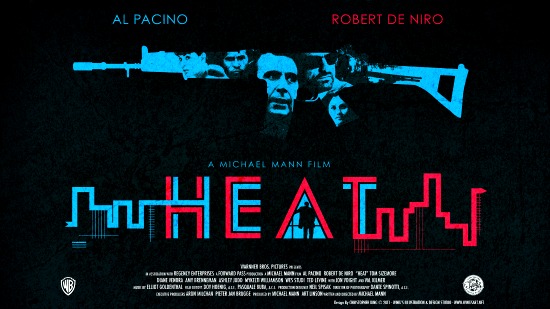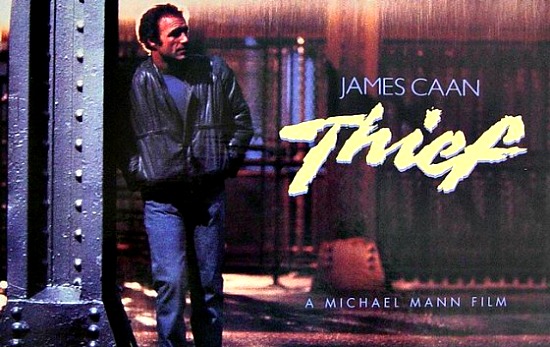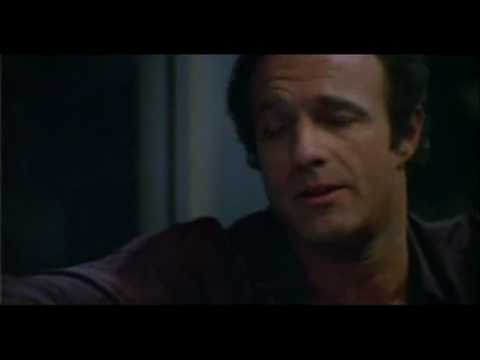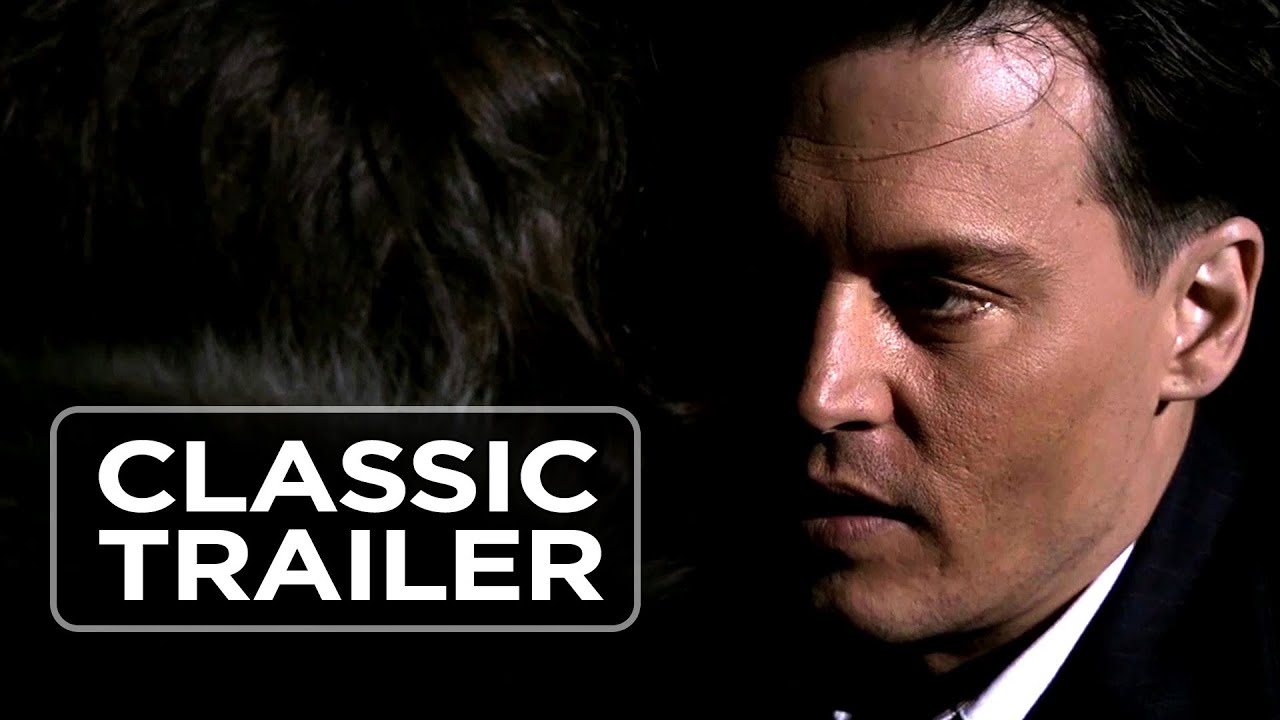Director Michael Mann tends to revisit his films long after their release, restoring footage for the TV broadcast versions or DVD releases of Thief, Manhunter, Last of the Mohicans, Heat, Ali and Miami Vice, or merely commenting freely about how, with hindsight, he feels he could have improved his work. In an interview at the Directors Guild of America in 2012, over 30 years after the release of his powerful debut feature, Thief – now available on Blu-Ray in an appropriately stylish and meticulously assembled package from Arrow Films – he was still debating his decision to use the music of Tangerine Dream to score that film:
“By string theory, in some alternate reality, there’s a version of Thief with wall-to-wall blues.”
It’s a remark that reaffirms the control freak image that has long been attributed to Mann, as much by awe-struck collaborators as by disgruntled former associates – and is just as happily in line with a more general expectation that directors are a Kubrickian caste of impossible-to-please nitpickers, whose measure of a good take is the extent to which they have sapped their collaborators of their enthusiasm for the project. However, apart from all the usual things that are said about Mann’s work – his striking visual style, his focus on professional men, his repetition of key themes – this unfinished or incomplete quality and the surprising extent to which his films remain for him alive and unfixed are key features that are rarely discussed. Even Heat, which on first encounter certainly feels like a resolved masterpiece, was tinkered with for its Blu-ray release. In fact, Heat was itself a second bite at the cherry, being a more expensive and ambitious remake of Mann’s unsuccessful TV pilot LA Takedown. He would subsequently roll the dice on a very similar plot yet again in the period trappings of Public Enemies.
Thief may have been Mann’s first film, but it too uses material from his earlier work. The wealth of research into prison life that elevated both his 1979 made-for-TV classic Jericho Mile and his uncredited – but easy to spot – work on the script for Straight Time feeds greatly into the backstory of the characters in Thief. The protagonist is Frank (James Caan), a car dealer – now free after spending almost half of his life in prison – who moonlights as a jewel thief who meticulously plans and executes his break-ins and safe-cracking. Frank’s bristling demeanour and single-minded approach to life reflect an outlook he cultivated in prison. It’s an attitude that has served him well both on the inside and the outside, distinguishing him from the crooks and cops who pose a direct threat, but, because of their sloppiness, venality, and self-indulgence, are easily overcome or defeat themselves. His desire to settle down with Jessie (Tuesday Weld) causes him to stray from his code of operating independently to take on jobs for Leo (Robert Prosky), a seemingly avuncular mob boss, who also aids Frank and Jessie in their desire to adopt a child. When Frank refuses to continue his partnership beyond the agreed term, Leo reveals his brutality, killing Frank’s right-hand man and threatening Jessie and their new baby. Reverting to the nihilistic perspective that had kept him alive in prison, Frank cuts all ties to the new life he has created, sends Jessie and the baby away, and directs all his fury at Leo and his thugs in what seems a suicidal gesture. In its bare bones, this plot sounds arch and rote, but Mann, his crew and a wonderful cast imbue it with style and conviction and elevate a B-movie premise into what Matt Zoller Seitz has referred to as “Zen Pulp.” This term neatly encapsulates the way in which Mann’s films deliver the expected visceral pleasures of the crime film, while finding space to get at feelings that aren’t usually the concern of this genre.
Around 35 minutes in, the film turns unexpectedly on a conversation. Frank, whose survival as a successful thief up to this point seems to be premised on his laser-like focus on his craft, makes a play for Jessie. In a late-night coffee shop, he pours out his life story and his hopes, arguing that he has “run out of time… so I’m just asking you to be with me.” Frank’s tough exterior masks the most innocent and romantic of desires. Folded up in his wallet is a card he created in prison – a naïve art mosaic made from cuttings from magazines and newspapers. Visually incomprehensible to anyone but Frank, it contains advertising images of a child, happy parents, a mound of skulls, a snapshot of his prison mentor, all bearing witness to his experiences, fears and hopes. Jessie is understandably taken aback as Frank lets it all hang out. So are we. In effect, Mann is putting it up to us to accept the same level of candour and naïve romantic expression. We have every reason to baulk. It’s an astonishing scene, fearlessly played and indelible. Like Jessie, we are won over.
There are other memorable conversations in Mann’s films, including the celebrated meeting of Pacino and DeNiro onscreen in Heat, and the wonderful encounter between psychological profiler Will Graham (William Peterson) and psychopathic serial killer Hannibal Lecktor (Brian Cox) in Manhunter, but even these are not as striking as the coffee-shop scene in Thief. Nevertheless, the pitch of feeling in that scene is something we can see Mann reach for, and often achieve, throughout his career. Each time, it demands the same tamping down of our resistance. In this way, Matt Zoller Seitz’s observation that a love of Terrence Malick’s films requires “a certain amount of credulity” also holds for Mann’s work. In the best moments of his films, Mann is just like Frank in Thief, handing us a postcard with what seem like the most naïve, romantic yearnings for love, home, comfort and family, which not only distract from the action we expect from the genre, but also overspill the established limits of feeling for this genre, offending our real-world, stress-tested conceptions of just how wary, guarded and unromantic we need to be. We can respond, just as Jessie does to Frank. We can be as unnerved by the gush of sincere feeling. Despite ourselves, we can also be moved. We can fall in love.
These moments of what Mann himself has described as “elevated experience” are sometimes staged so as to be experienced simultaneously by the characters and the viewer, as when Francis Dolarhyde (Tom Noonan) – the almost pitiable serial killer in Manhunter – nearly swoons as he watches his blind colleague (Joan Allen) touch the fur and fangs of an anaesthetised tiger. Sometimes they are strictly for the viewer, as in Miami Vice when, in an impossibly smooth aerial shot, we swoop down onto Crockett (Colin Farrell) and Isabella (Gong Li) as they speed towards Cuba on his powerboat, literally bouncing on the waves. Then there is the wordless moment in Heat when Vincent Hanna (Al Pacino) is released from a vigil over his suicidal step-daughter at a hospital to pursue bank robber Neil McCauley (Robert de Niro), and skips down the hospital steps in a move that, no less than a Fred Astaire number, physically conveys absolute joy at his release back into the wild. If any aspect of his characters’ interior lives feels like it can be captured in any other way than simply having it described or discussed, Mann will always take that option, no matter how jarring it might be to a composition, or whether it even takes our focus away from his characters completely.
Again and again, Mann replays the same beats as if intent on refining the material to the point of greatest purity, or complete abstraction. His willingness to keep searching in his films for something that has eluded him, even decades after a cinematic release, makes the films themselves provisional texts. Judged merely by the recurrence of themes, characters, visuals and even dialogue, this quest has narrowed into a painstaking, fingertip search of a delimited space. His search for the perfected version of each film has resulted in a matrix of similar-but-not-the-same features that gives his output a symphonic quality and tests the degree to which we are attuned to these patterns. Over the years, some things have been jettisoned – the composed and scintillatingly crisp cinematography of his films up to The Insider has given way to the noise and restlessness of digital cameras unfussed about focus and willing to stray from the ostensible point of interest at the least provocation. Clear dialogue has been replaced with muddied, mumbled phrasing. Even the notably plain speech of characters such as Frank in Thief or Will Graham in Manhunter has been replaced by unexplained jargon in a lurch towards what Peter Bradshaw once praised as a “radical reticence.” Referencing the shift in his cinematic vocabulary, Mann said in an interview with Geoff Boucher, "It’s liberating to jump into the stream of a story and jump into the stream of a character and convey by attitude, ambience and the tone of that person — and their surroundings and how they’re reacting to those surroundings — the magic of what’s happening. When you can bring the audience into understanding and they have leapt over that little gap, and they’re getting it on their own, it’s a much more intense involvement."

Over time and through reuse, those elements that were initially derived from research, and reflected some real-world experience, have become floating signifiers of Mann’s own tendency to build a world from the same recurring units. As his filmography has grown, this tendency to replay and rework has become much more marked, so that, in his own way, Mann’s work has become as mannered and unreal (or hyperreal) as that of Wes Anderson. What has not diminished, however – and is also certainly true of Anderson’s most recent film, The Grand Budapest Hotel – is Mann’s ability to create powerful effects from the almost tonalist limitations he has set for himself.
In his best work, such as Thief and Heat, the film – in Melville’s terms – spins against the way that it drives, the thrill of the action dissipates, the sound of gunfire fades away and we feel the existential (if not existentialist) ache of the individual in the world. In his devoted trudge along the well-worn paths of crime genre, Mann discovers some surmounting point that feels way beyond what is required from our acquaintance with cops-and-robbers films. We intrude on the sublime. It’s the search for this numinous quality, and the dissatisfaction felt when it isn’t found, that means that this director can never truly put his films away.
Oddly, this feeling of transcendent discovery is experienced most strongly in one of his worst misfires. On paper and in anticipation, Public Enemies read like a textbook Michael Mann film. Like Manhunter, LA Takedown and Heat, it would draw on the energy of two men facing each other across the line of cop and criminal, with John Dillinger (Johnny Depp) and Melvin Purvis (Christian Bale) as historical prototypes of, respectively, every autodidactic, detail-obsessed thief in Mann’s oeuvre and every single-minded cop who spares no effort to get his man. In reality, however, the film was DOA with Johnny Depp’s self-regarding Dillinger never truly fitting into Mann’s template of coldly disciplined criminal and Christian Bale’s Purvis fading pallidly into the background. This criticism wasn’t just something thrown at the film; it seems to be something acknowledged within the film itself, as if Mann himself realised that these tepid top-line characters did not properly serve his abiding interests. The birth of modern policing methods may have provided Mann’s catalysing interest in Melvin Purvis and this story, but, as the film drags on, Purvis’s modernism seems an anaemic subject. It is edged aside as the cowboylike federal agent Charles Winstead (Stephen Lang) and his fellow manhunters arrive, looking literally like they been deputised from a Western to get the bad guy and introduce a more reassuringly masculine force to the lawman side of the film’s ledger. Winstead is the consummate professional, unpretentious and without a thought in his head, except how he can apprehend or kill Dillinger. These values make him the proper protagonist for a Michael Mann film. His counterpart, however, isn’t Dillinger, who, in Depp’s portrayal, is just the sort of spontaneous, good-time Charlie that Mann’s films despise and usually punish: Winstead’s opposite number is Dillinger’s moll, Billie Frechette (Marion Cotillard), an outsider with little stake or security in the world in which she finds herself. Like Jessie in Thief, her choice of lover has put her at risk of losing what little she has. The shift in the film’s magnetic poles from its ostensible subjects to these secondary characters gives birth to a last-minute epiphany, a scene spared the presence of either Dillinger or Purvis. Mann chooses not to end the film with Dillinger being shot dead by Winstead outside the Biograph movie theatre in Chicago. Instead, it ends with Winstead’s visit to Frechette in prison. Billie shapes to accuse Dillinger’s murderer, but he catches her off guard by telling her he is fulfilling Dillinger’s request to tell her his last words. Billie cries, but her tears don’t feel like a stirring romantic retrieval of Dillinger’s devotion to her, offering the unimpressive gangster some kind of post-mortem apotheosis – after all, we’d just seen he’d taken up with another woman and witnessed that his last words were inaudible. The sublime quality of this ending lies in the fact that Winstead and Frechette see each other more clearly than any two other characters in the rest of the film. Winstead, the stoic professional, recognises that Frechette is alone in the world. As pragmatic and unsentimental as he appears, he reaches out to her, recognising that all she had has gone with the death of Dillinger. With nothing else to offer, he chooses to tell her something pretty. What catches Frechette’s heart off guard is not the supposed message from Dillinger, but rather the fact that it is Winstead who recognises her position and makes this unnecessary gesture. An otherwise poor film achieves a magical ending almost out of nowhere as two unlikely characters meet on a plane of unexpected empathy.
In the absence of its marquee stars and its supposed central characters, the film concludes with the only man and woman who would properly fit into any other Mann film. It’s a scene that testifies that the film’s true focus lies not on the charisma of bankable stars playing shoot-em-up in period costume, but rather in mustering genuine feeling, and, to paraphrase one of the characters in Last of the Mohicans, finding something that is more deeply stirring to our blood. We can find that feeling readily in films such as Heat, Manhunter and Thief, and we can be sure that Mann will continue to look for it for years to come.
Thief is out on blu-ray now from Arrow. You can follow Tony McKiver on twitter @TonyMcKiver




